#Tom Hiddleston Meta analysis
Text
This is CRAZY how accurate these insights to who Tom Hiddleston is as a person seem! 🤯
https://www.sunsigns.com/celebrity/tom-hiddleston/what-is-tom-hiddlestons-personality-type
https://www.sunsigns.com/celebrity/tom-hiddleston/what-kind-of-person-is-tom-hiddleston
https://www.sunsigns.com/celebrity/tom-hiddleston/what-does-tom-hiddlestons-psychology-tell-us-about-them
https://www.sunsigns.com/celebrity/tom-hiddleston/what-tom-hiddlestons-psychological-profile-reveals-about-their-true-self
https://www.sunsigns.com/celebrity/tom-hiddleston/who-is-tom-hiddlestons-perfect-match
https://www.sunsigns.com/celebrity/tom-hiddleston/what-does-tom-hiddlestons-astrological-guidance-say-about-their-future
https://www.sunsigns.com/celebrity/tom-hiddleston/whats-tom-hiddlestons-dominant-astrological-sign
#Tom Hiddleston#Tom hiddleston psychology#tom Hiddleston personality#Tom Hiddleston psyche#hiddles-psych#interesting albeit a bit creepy as to how accurate all this seems!#psychology#astrology#star signs#Aquarius#mental health#spirituality#biography#analysis#meta#TH meta#Tom Hiddleston Meta analysis#Tom Hiddleston case study#personality analysis#Tom Hiddleston is an amazing and unique person with a kind soul and large heart!
7 notes
·
View notes
Text
no but think about the Loki from Thor. from Avengers. the fact that he’s fighting for something good that he believes in means so much. the fact that he can sit there and say he just wants his friends back. these friends. the ones who see him for him. who don’t judge him. who he feels like he BELONGS with.
when has Loki ever felt like he belongs anywhere? he’s always been the outsider, the outcast, the villain. at the TVA he has felt appreciated and accepted. no one is singling him out or giving him a hard time for being himself. he FITS. he has come so so far. and shipping aside, the main reason for that is Mobius. someone who has seen every dark crevice of his life and his bad choices and his darkest moments and treated him with compassion and understanding.
the orphaned, abandoned, misunderstood villain has been able to write his own story because one ordinary man believed in him.
#loki#mobius#lokius#i am not ok#this has me reeling#i don’t think you understand how much Loki means to me and Mobius with him#what a beautiful fucking story#what a character arc#loki season 2#loki spoilers#mobius m mobius#loki friggason#tom hiddleston#owen wilson#marvel#mcu#avengers#pretty rambles#loki meta#loki analysis#loki laufeyson#loki series#loki odinson
2K notes
·
View notes
Text
I like to think that one of Mobius' past habits, before he was reset, was to go to this tva room to eat his delicious slice of pie at the most stressful times. Unconsciously he guided and welcomed Loki into his comfort zone, but not only that, he managed to communicate his anger and fears to Loki.

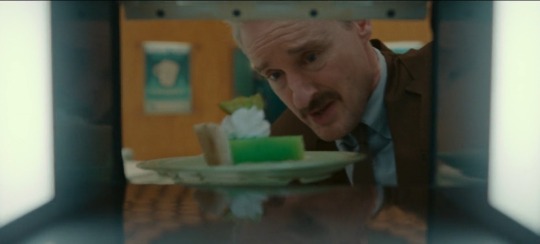
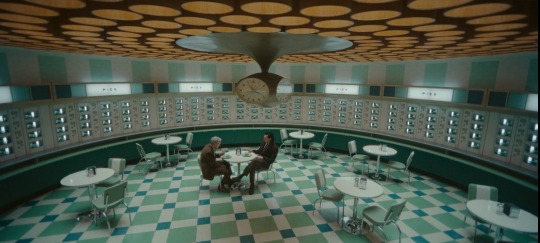
#mobius#owen wilson#loki#lokius#tom hiddleston#time husbands#husbands#loki 2x02#pie room#mobius analysis#loki meta
336 notes
·
View notes
Note
so not to make it weird or anything, but you like the loki show? it seems kind of anti God (can explain if you want)
It might be, a little, after watching the second season. I just think it's well-done (the first season; second one's hit-or-miss.) I also like the points they make about "free" will, and "who gets to decide?"
Basically, it starts an intellectually honest conversation about free will. And it's a very, very good character study of Loki. Which I think is what the point of the show is: who is Loki, and once he understands who he is, what does he do with that?
Now. The show doesn't have much coherent to say about God, our God, the real God. It has no answer for a true higher power. He Who Remains starts out like a higher power simply because he's outside the timelines, controlling them. But he's a fallible human mortal, who had a beginning, and can be thwarted. All of that makes him not a higher power—just another super-powerful person. Then at the end of the show Loki seems higher-power-esque...but you have two problems with Loki As Higher Power. One is that he also is a fallible mortal, same as the problem with He Who Remains. (You know what I mean. He's a superpowered alien, not an eternally preexistent being outside of our reality.) But the other problem is that he's passive.
So if anything, the most anti-God thing about the show is that it has no good answer for "Okay, so everyone has a choice—even if they're not gods with every choice available, they have some wiggle room to choose. But who made the choices possible?" The show has no good answer for that question. Because it either says "a fallible tyrant made the choices possible" or it says "a passive but sort-of benevolent guy makes the choices possible--but that's all he does."
God is neither starting up the machine and then stepping back passively (Loki in the Chair)—nor a tyrant (He Who Remains.) He is better and outside of all of that.
But I really don't think the show was trying to comment on our God, the God of the Israelites and Christians. I think it was trying to comment on Loki, and because Loki starts the show thinking of himself as a god, it has to explore those themes to stay true to the character.
So. Yes, I like the first season. But that doesn't mean I can't acknowledge the problems in it. Tell me more. What do you think of the show's relationship to a commentary on the real God?
#Loki#Loki show#Loki series#Disney+#sylvie laufeydottir#sylvie#loki laufeyson#tom hiddleston#Odin#Thor#marvel#MCU#marvel cinematic universe#Christianity#free will#meta#commentary#analysis#writing
16 notes
·
View notes
Text
I'm finally watching Loki for the first time and man... it's bad. I'm enjoying it a LOT, but it feels like a fanfiction.
Currently on episode 3, where we have a several minute long of two-camera dialogue scene about the nature of love and family. It's well-acted and charming, but how did this make it into the final cut of a major studio's show? No interesting cinematography, no embellishment of any sort. It's played as a moment of respite between action scenes, but the action wasn't especially intense and the hook for the conversation ("that woman was in love") is tissue-thin.
This is the third episode, so you'd think there would be some carrying forth of the established themes. There sort of is: Sylvie talks a bit about the TVA being fascists, and Loki talks a bit about his mom. Alternatively, they could throw us into this new thread of the plot with intense drama, to make it more impactful later when the two worlds collide.
What they did instead feels like fanfiction. I don't say that as an insult - it reads like a fanfiction that I would leave lovely comments on, complimenting the dialogue and action! In a finished show, however, it just feels like they didn't have a good vision for the story.
Anyway, it's lovely to see a filmed and edited Loki Whump selfcest fic, and Hiddleston makes basically anything worth watching.
#loki series#tom hiddleston#meta#literary analysis#please don't take this as an insult#I enjoy bad media more than good media#there's so much to talk about#Loki#Sylvie
1 note
·
View note
Text
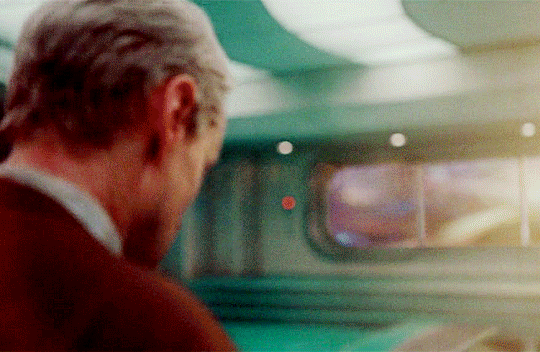
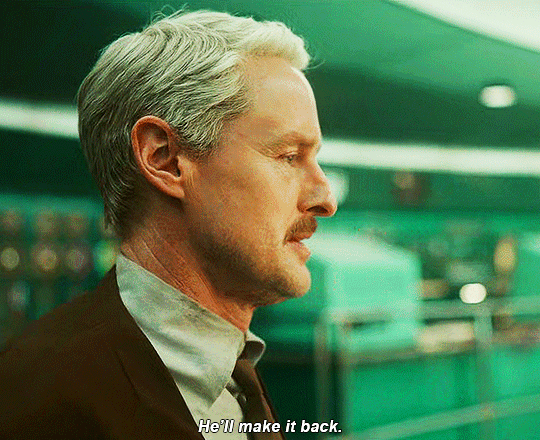
LET'S TALK ABOUT "HE'LL MAKE IT BACK"
Special thank you to @mmobiuses, @starrose17, and @stevenrogered whose gifs make-up the lion's share of this post. Thank you to all the other amazing gif artists as well, without you, my metas won't be possible.
This might come as a surprise to a lot of people, but I actually wasn't big on Lokius until Season 2. I thought Loki and Mobius made a cute ship in Season 1, but that was the extent of it. In truth, I lost interest in the Loki series by the S1 finale and had 0 interest in watching S2. I didn't give the series another try until I saw positive reviews on Tumblr. I therefore started watching S2 when S2E4 dropped.
LOKI SEASON 1
Enjoying the potential love story between two characters is a deeply personal and subjective experience. So take what I say as my personal experience observing Loki and Mobius's relationship.
I fully believed Mobius loved Loki in S1 in the platonic sense. Tom Hiddleston has given a few interviews on Loki's and Mobius's relationship and seems to believe in this sentiment as well [see 5:30-7:30 and 10:57-11:00]).
That is to say, in S1, I didn't feel, "Oh, my god ... he loves him." It was more, "Yes, he loves him", there is no question, his actions prove it.
There is wiggle-room for unrequited love in the S1E4 interrogation scene, but the jealousy Mobius exhibited could have just as easily been a combination of anger on behalf of his murdered colleagues and platonic jealousy.
However, I felt the first hint of unrequited love from Mobius occurred during his goodbye scene with Loki in S1E5. Specifically, this look:
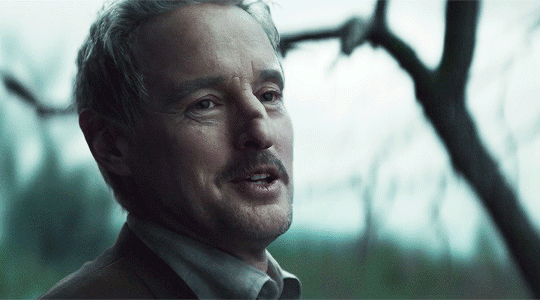
I had no expectations for that look to pay off in any way. Season 2 surprised me.
LOKI SEASON 2
S2E1 is amazing episode because, through subtext, it reframes how Mobius's S1 emotions may be interpreted with stronger evidence for romantic motivation. In this episode, there appears to be a subtle, gradual build-up to the moment that Mobius's love for Loki may be viewed as fully romantic. Let's break down the episode and look at the progression:
First, learning that Loki is at the TVA: *sigh* I can't find the "Loki's here?" gif.
Second, and perhaps the most infamous, the reunion and whole-body support Mobius provides Loki in the TVA War Room (physical comfort):

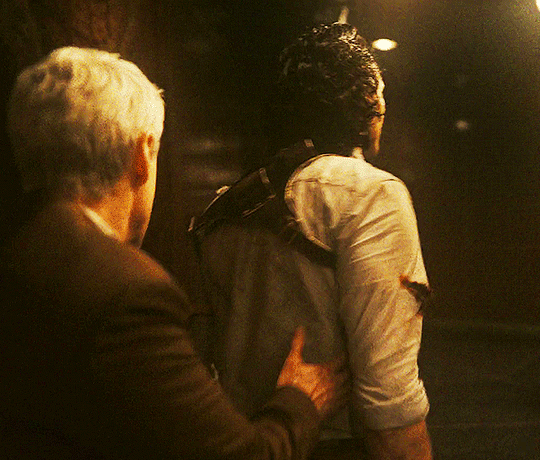
Third, Mobius bringing Loki somewhere safe and quiet, assuring him that "it's okay" (emotional comfort):
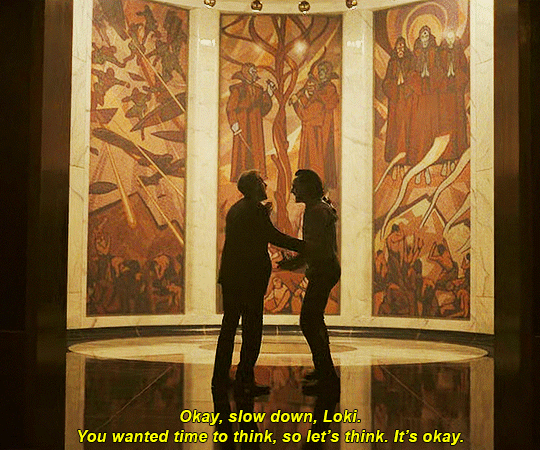
Fourth, Mobius insisting that Loki's condition must be fixed, not once but twice, in two different scenes. A third (writer's magic 3s!) instance occurs in the Heart of the TVA, just before the gangway scene (prioritizing the other):


Fifth, Mobius's admission that Loki's timeslipping looks horrible, and he can't look at it anymore. He repeatedly stresses to Loki how serious this is (emotional and physical empathy):
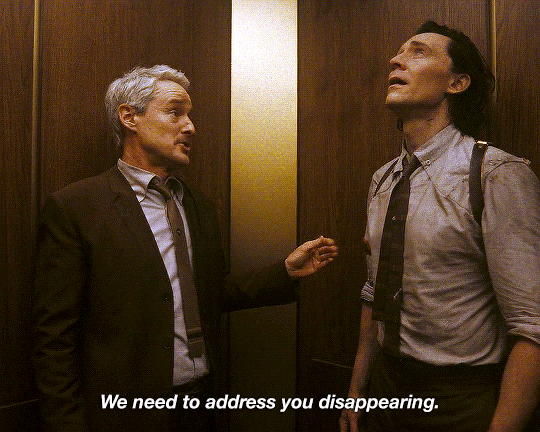
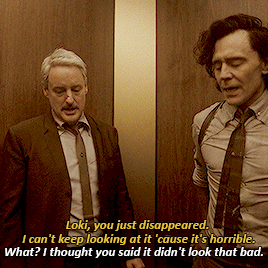

Sixth, Mobius taking Loki to exact right person who can help. This is particularly significant, because Mobius is the only person in MCU canon who has verbally expressed concern for Loki's physical well-being and took immediate action to stop the pain (act of service):

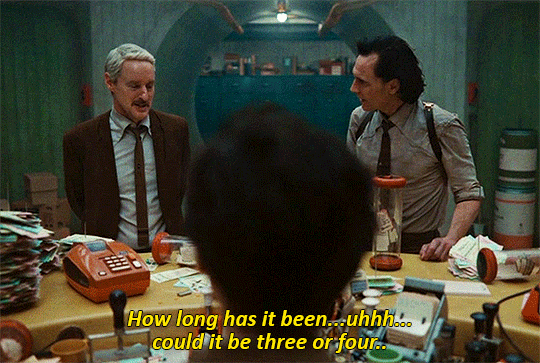
Seventh, the third time Mobius prioritizes Loki's wellbeing. He scolds Loki and reminds him they have only one shot at getting his timeslipping corrected before the temporal radiation becomes too high (prioritizing the other):
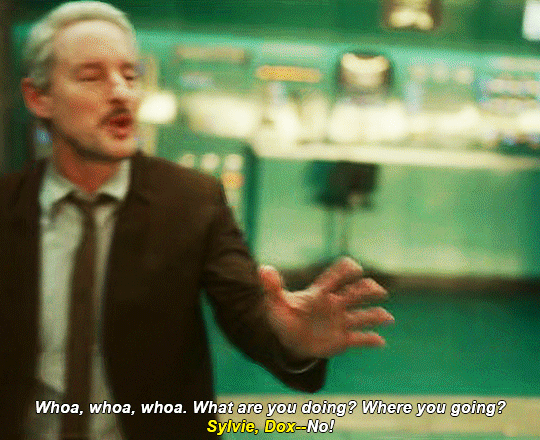
Eighth, Mobius interrupting Loki, insisting that he will make it back. The subtext here is that no other outcome is acceptable or thinkable for Mobius (emotional comfort):

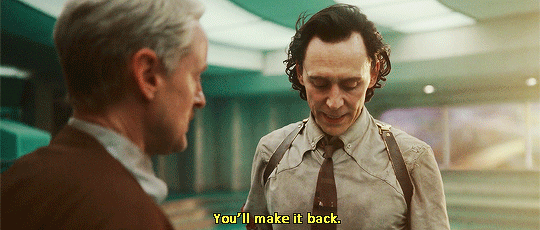
Finally, Ninth, the clincher: "He'll make it back." (self-comfort)
This scene is everything to me. Moments 1 through 8 build-up to this singular moment. Let's do a micro-analysis on it.
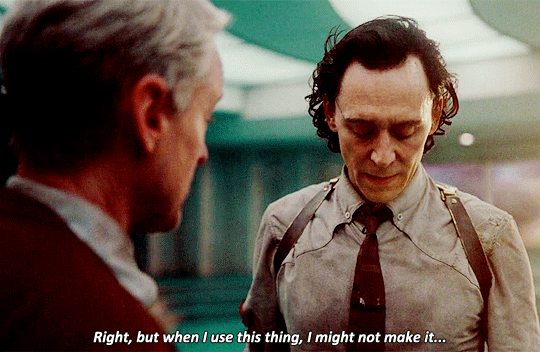
After Loki timeslips, the camera stays on Mobius. It tracks him as he kneels down to pick-up the time sick, the last thing Loki touched. The camera then pans up as Mobius rises.

@stevenrogered, THANK YOU for this gifset. It's literally the only one I could find that captures the camera tracking Mobius after Loki disappears, and this is my all-time favorite Mobius scene.
Mobius stands for a moment, motionless, and the camera holds on his facial expression. He's staring at where Loki WAS for extended period of time (keep this in mind for later). He's holding his breath. He's worried, scared, and hopeful, not for himself and the danger he faces on the gangway, but for Loki.
Finally, he exhales as he says to himself, "He'll make it back".

This entire sequence--particularly the moment when Mobius picks-up the time stick and holds it in silence--made me feel, "Oh ... Oh ... he loves him."
The camera stays with Mobius, capturing his reaction to this high-stakes situation for a significant amount of time (@loki-us, maybe you can get this timed starting from the moment Loki disappears and Mobius starts to kneel to pick-up the time stick?). Cinematographers don't do this type of hold unless they want to illicit a strong emotion from the audience regarding the character we are focusing on in the moment.
My insides swooped, which rarely ever happens when I view film or television.
And this camera hold, this pregnant pause, is mirrored by Loki's stare in S2E5:

352 notes
·
View notes
Text
It’s my birthday, Pride is half over, and the Sylki fandom is half dead.
Here’s a useless meta proving Sylvie and Loki are closer to an Andrew Garfield vs. Tom Holland Spider-Man situation than “GeNdErBeNt SeLFcEsT”
🐍🐈⬛🐍🐈⬛🐍🐈⬛🐍🐈⬛🐍🐈⬛🐍🐈⬛
When Sylvie was introduced, all Loki variants presented so far resembled Tom Hiddleston. By episode five, we know the vast majority of Loki variants are not Tom Hiddleston clones, (like a Spider-Man, a Loki could be anybody,) so Sylvie likely isn’t his clone either. However, since they’re played by different actors, with vaguely similar facial features, it could still be argued that perhaps Loki and Sylvie are the same individual, just the “other sex.” (Insert iconic Loki eye roll). Today I’m demonstrating why that argument is stupid.
Skin ~ Loki’s skin tone is consistently cooler and paler than Sylvie’s, as demonstrated by earlier films. His skin is more neutral and saturated in the series, a decision by Tom Hiddleston to make Loki seem more alive and tangibly real. Still, his typical skin tone is best described as a creamy ghostly porcelain, whereas Sylvie’s is a light rosy beige. Sylvie has a rougher, less polished, more ‘human’ look, whereas sacred timeline Loki sometimes verges on the ethereal. These skin details suit their characters well.
Tom and Sophia filming season two
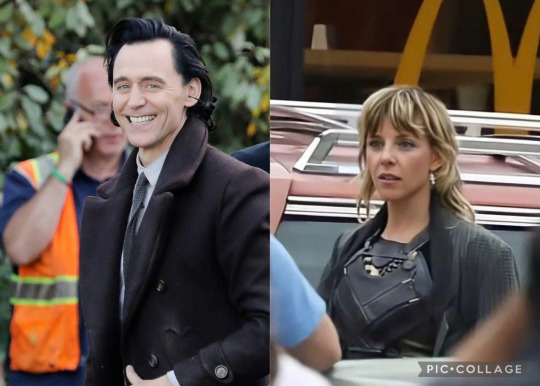
Note: Sylvie’s skin seems slightly tanned in this image, while Loki looks as deathly pale as he did in the movies. Likely a difference in lighting, but I think it does a good job showing how different the two characters can look at a glance.
Hair ~ this is the strongest argument. Loki’s natural hair color is visibly darker and deeper than Sylvie’s natural hair color. Loki’s hair is raven black, and Sylvie’s hair is dark brown. Sylvie dyes her hair a muted ash blonde.

Loki and Sylvie side by side.

This hair color difference is suspiciously intentional, and even carries over from final concept art, official merch, and their child actors. Baby Sylvie’s hair is dark ash/golden brown in better lighting. Baby Loki’s hair is always raven black.
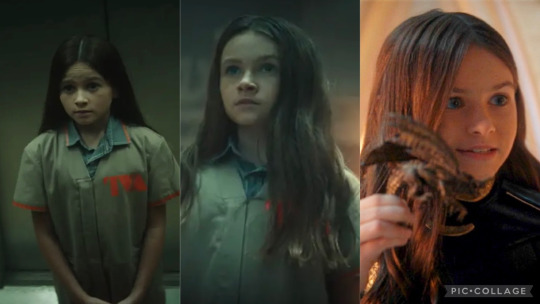
Baby Sylki. (Look at these little squishies I want to boop their noses!)

The two variants also have noticeably different hair textures. Loki’s natural curl pattern seems messier and tighter than Sylvie’s fluffy waves, even with too much greasy hair product.

Contrast ~ Sophia and Tom’s eyes are similar shades of blue. Less is certain about the in character eye colors of Loki and Sylvie. The fandom is not in agreement whether Loki’s (and Sylvie’s) eyes are blue or green, so I tend to compromise on blue-green. Tom’s eyes appear slightly lighter than Sophia’s, so I headcanon that Loki’s eyes are lighter than Sylvie’s too. Combined with their hair and skin tone differences, Sylvie has a lower, softer, more muted contrast between her hair, skin, and eyes, compared to Loki, with their higher, clearer and more striking contrast.

Color Season Analysis ~ Going off of that, and taking this next part with a grain of salt, as I am in no way an expert on color analysis, I would guess Loki is a winter, and Sylvie is a summer. Sylvie could be a spring, but from what I’ve seen, her hair is more ashen than yellow, and it makes sense Sylvie would lean cooler then warmer since she, as a former Loki variant, is a frost giant.

Summers typically look best in sunny pastel colors, whereas Winters look best in jewel tones. Sure enough, when Loki and Sylvie venture outside their classic green, black, and gold, the costume department decided to dress Loki in deep jewel tones such as blue and purple (the guard turtleneck, some of their costumes in Ragnarok.)
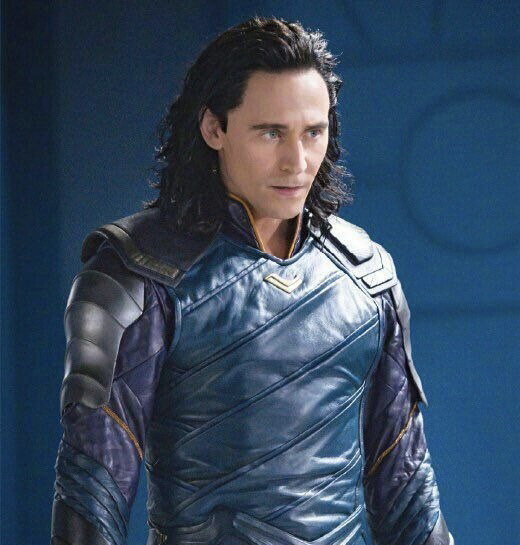
Another costume department chose to put Sylvie in subtle pastels (her tie die shirt.)

Typically, cool seasons look better in silver (grey) than than gold (yellow). Coincidentally, Loki and Sylvie are both wearing gray in the pictures above. Obviously, Lokis are to gold as goths are to black. However, few people fit a color season perfectly (I’m ironically a winter in the winter and a summer in the summer,) Sylvie and Loki have fairly neutral pigmentation, and saying a Loki wouldn’t look good in gold is blasphemy.
In Summary ~ Sylki are not genderbent clones, they’re not identical twins, and though it’s near certain they don’t share much dna at all, because this is not Game of Thrones, the closest they could physically be is full siblings, and while it would be questionable, your siblings aren’t you, so it wouldn’t be selfcest.
If the multiverse was a cinematic universe, Loki and Sylvie would be two different actors playing two different adaptations of the same character by two different studios, at most. Loki and Sylvie have different personalities, different experiences, different bodies, and different lives. Honestly, they’ve lived such different lives, with Sylvie breaking away from her sacred timeline and Loki identity so young that she’s a different gender and mostly based on Sylvie Lushton, that they are possibly less the same character than any of the Spider Men variants, from Spiderverse through MCU. Likely, all the two share is a mind, heart, and soul. To me, that’s beautiful.
⚔️💚⚔️💚⚔️💚⚔️💚⚔️💚⚔️💚⚔️💚⚔️💚⚔️
23 notes
·
View notes
Note
So like random Crimson Peak discussion time, but do you think Thomas was a straight up bad person, or a tragic figure? Cause I've seen some opinions about how he's just as bad as his sister, etc. and I was like, "Are you serious?" I don't think I'm woobifying him by thinking he was just as much a victim as anyone else.
Oh my gosh I am so glad you asked because I have been thinking about this exact question all day and wanted an excuse to talk about it. This is going to be a deep deep dive so sorry if you weren't wanting that haha, it's long.
Short answer if you don't want my detailed thoughts, no I don't think that he's a straight up bad person. I personally believe he's framed heavily as the tragic figure throughout the film and was on a path to redemption before he's killed. I do believe that Lucille is worse in some ways and that she's painted as being pretty irredeemable, however, I also believe she's a tragic figure.
Ok so deep dive time as to why I feel the film portrays the Sharpe's both as tragic figures and why Thomas is more so painted as a redeemable victim than it does Lucille, who is a victim as well but is painted as far less redeemable.
So, first, I think it's a super complex situation that is clearly complicated heavily by early childhood trauma in both the Sharpe siblings lives. Both kids were raised in an abusive home where both parents, at best, neglected them and at worst assaulted them (physically, verbally, emotionally is all heavily implied when not outright stated by Lucille). If we can believe Lucille she took the brunt of the abuse to try and shield Thomas by taking beatings for him and by being the caretaker for their invalid mother who had previously kept them locked in the attic but later came to depend on them to survive.
We later learn that this trauma was clearly the catalyst for Lucille's violent psychopathy. She snapped when she was 14 and murdered their mother, essentially freeing them from their tormenter and, I believe, began her psychological and violent break. Thomas then goes to boarding school and Lucille is sent to what is implied to be a mental hospital/facility of some kind. Which, if you know anything about these types of facilities in the era in which the film is set, they were horrific abusive places which likely only worsened her violent tendencies.
Now, knowing the traumatic history of the siblings we can think about one of the two main evil’s in their life: the murders. I think that the film initially keeps the audience in mystery about who of the Sharpe siblings is committing the violence in the film. The person who kills Edith's father is obscured, but wearing a black suit, so the audience implies it was Thomas who kills him. It's Thomas's wives who are killed, so it makes sense to believe maybe it's him who's killing them too. But as the film goes on we learn that he is uncomfortable with violence and that it's actually Lucille who has the violent and murderous nature. She is actually the one who killed Edith's father, she's the one who killed their mother, the one who poisons Thomas's wives (though he is most definitely a part of this as well). She's the one who takes trophies from everyone she's killed (the hair of the wives, the meat cleaver, the trunk, etc.).
When Dr. McMichael appears at the hall, Lucille asks Thomas if he'll finally do it, finally take his turn of the killing, and hands him the knife. She's always been the one to kill, and the film implies that she enjoys killing through the way she recounts her kills and in how she takes and keeps trophies from them. In this way Lucille, is unremorseful and painted as more irredeemable than her brother. Thomas on the other hand, it is unclear if he has actually ever killed anyone himself personally. It is, at least, implied that he hasn't by how Lucille speaks to him about killing the doctor. Now, he has stood by and allowed Lucille to kill, which is essentially as bad, however, he is painted as being more uncomfortable with murder and violence. This, then, paints him as more redeemable that Lucille. Thomas refuses to kill Edith or let Lucille kill her because he has fallen in love with her. Thomas saves the Dr. by pretending to kill him but asks where to do a non-lethal blow because he knows that the Dr. can get Edith to safety and his love for her means he puts her safety over his own desires and is willing to let her go.
I feel that, overall, any violence Thomas commits or allows is heavily due to Lucille's grooming and manipulation of him from a young age and that it's not in his nature to be violent on his own.
Now we come to the second main immorality in the lives of the siblings: their incestuous relationship. It is said many times in the film that throughout the trauma the siblings experienced they only ever had each other. This is the reason Lucille gives for the fact that they are in an incestuous relationship. It's unclear who started what, however, she's older than him and throughout the film we find out it's her calling the shots. She makes the decisions and Thomas follows, which lends the viewer to believe it is likely she groomed and coerced him into a relationship. She talks about how beautiful he was as a boy, that she shielded him from their parents and that he was hers because of that. All of which lends to the belief that she's the one who initiated their relationship. It's also said that their mother discovered their relationship shortly before Lucille killed her, so Thomas was 12 and Lucille was 14 both young and damaged enough for something like this to happen due to their trauma.
All of this is awful. Lucille was most definitely a victim of her parents abuse, which was why she then becomes an abuser of her brother and a psychopathic killer. She shielded him from a lot of the abuse of their parents but then abused him in her own way in return. He's a victim of her and a lot of his behavior stems from her abuse of him. The film makes it clear he feels trapped by her. She's always taken care of him, she protects him, she makes sure they have money for his inventions, and she's the one and only person he believes loves him. So even though he knows much of their lives are wrong, that her murderous nature is wrong, that their incestuous relationship is wrong, he can't escape her because she's all he has.
Until he meets Edith. Edith makes him realize that his life can be different. That there is someone who loves him, doesn't want to manipulate and abuse him, and who values what he does for no other reason than she finds it beautiful. She’s brought to the most awful house, they’re literally poisoning her, and yet she still loves him and treats him as if he has value. (Literally don’t get me started on their relationship because I could talk forever just about the way he looks at her.) In the final scenes of the film we see how hard he tries to fight for Edith. To save her. He keeps her doctor friend alive, he lets her leave, he burns the asset papers, and he even tries to convince Lucille to let her go because deep down he’s always known it was all wrong and it was his love of Edith that made him realize this.
Ultimately and tragically though, as it often is with abuse victims, even though he loves Edith, he can't let go of Lucille, his abuser, because of their history. He tries to convince Lucille they can start a new life all three of them and this is his final mistake. This is the final straw for Lucille, because she feels she's lost him and that if he loves Edith enough to leave everything behind she’s truly lost him. So she kills him, because if she can't have him no one can.
There's more I could say honestly, this movie and these characters have so many layers I could write a long and detailed paper about it. But to summarize. Both the Sharpe's are tragic figures. Both are victims of their parents and Thomas is a victim of Lucille. Both of their bad behavior and evil actions stem from their trauma, but it seems Thomas is the only one capable of truly seeing their actions as wrong and being capable of change and redemption. Lucille believes that if what she does preserves her and Thomas's love that it's worth it and doesn't seem to have any remorse for any of her actions. In fact, she revels in it while Thomas is horrified by it. Thomas tries to redeem himself, and I believe does, as he gives up his life for Edith. This is contrasted with Lucille's parting words: "I won't stop, not until you're dead or I am." Which would always have been true. She never would have stopped killing because it was a part of who she had become. So in the end the Sharpe's are both victims, both perpetrators of evil, and one is redeemed before they die while the other is not.
112 notes
·
View notes
Text
What Did You Expect?
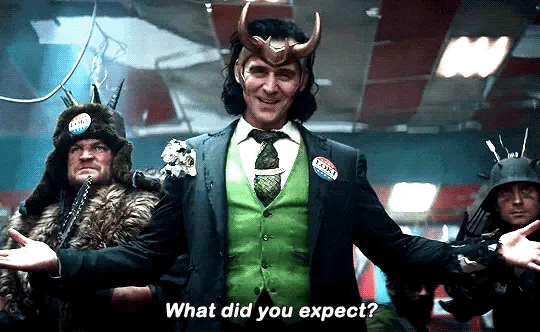
Okay, let’s talk about something real quick.
This Loki? This one right here? Suave and in control, head of a ragtag militia of “lesser” Lokis, and being so utterly contemptuous and confident and reveling in the Loki-ness of it all? And on top of all of that, wearing the same exact face as our protagonist Variant Loki?
Yeah, this is what I was expecting. This is what I wanted to see from the second I heard there was a Loki Variant hiding out in apocalypses, evading the TVA for years, leading them into traps and committing covert killings and plotting a mysterious and inimical endgame.

They undercut the idea of this other, more competent, more dangerous Loki pretty fast with some more cheap humor and whatnot—but for a moment we got a glimpse of what might have been.
Because that initial set up? New York Variant Loki versus a Loki that spiraled so far out of control that he was menacing the very fabric of time itself? That was just—words can’t even describe how perfect it was to me.
Because Loki has always been his own worst enemy.

He became the monster he thought others would see him as if they knew he was a Frost Giant. He tried to commit unspeakable horrors to prove himself and earn his father’s love, and that twisted into something dark and dangerous and exploitable in the void so that Thanos was able to contort him into the vessel he needed to perpetuate his intergalactic purge.
And whenever someone trusted Loki or showed him love, he literally could not comprehend it, not when his own self image was so distorted. So he chose not to trust that trust, or put any stock in it—he hedged his bets and preempted the inevitable heartbreak. Betray them before they betray you and you’re safe, you’re in control. Every backstabbing, every betrayal—he thought he was protecting himself, making strides towards the “glorious purpose” of power that would never fill the aching absence of love in his life.

But TVA Loki was derailed from this path—from this symphony of shame and pain that ends tantalizingly short of true closure and healing—and he was given a chance. He was given the chance to evaluate the actions of his past and the promise of his future—what he was supposedly destined for and the utter vanity of it all. He was given a chance to be anything he wanted, even good. He was given a taste of friendship with Mobius, he was given the opportunity to examine who he really was and who he wanted to become.
With this Variant Loki, we would see Loki at his best, a Loki that knew himself and knew friendship and love and knew what he really wanted out of life.
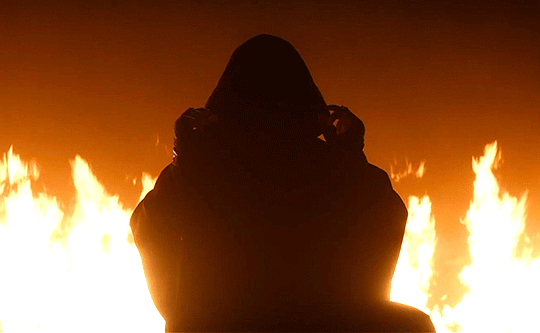
And with the other Loki? We would see all the worst of what he could be. If our protagonist Variant Loki developed to be the best version of himself, then this rogue, time-slaying Loki would be the very worst of what he could be. This Loki would be the cruelest, most ruthlessly effective potentiality of the character—someone so lost in the chaos and pain that he was driven to nothing more or less than the total destruction of all reality and all time across all universes. Because if nothing could fill that gnawing hole inside him, then he’d wreck and refashion existence to match the desolation of his soul.

If reality had followed expectation, we might have had the most perfect on-screen visualization of being your own worst enemy. Of the potential for good and bad in all of us, and how it is our choices that define us, and that we can always choose differently. And it just burns a bit, to know that that wasn’t the story they were to tell.
Don’t get me wrong, I’ve enjoyed the show quite a lot, and it’s had some fascinating twists and turns. But with that Void full of Lokis in episode 5, I couldn’t help but think of what it was that I had expected from the end of the very first episode. And I just wonder, you know? About what could have been.
#loki#loki series#loki meta#loki analysis#loki au#loki gifs#marvel#loki laufeyson#mcu#tom hiddleston#loki gif#loki tva#loki and mobius#mobius m mobius
109 notes
·
View notes
Text
It's not jealousy because in that moment he was feeling a worse emotion.
Mobius studied every details of Loki life and knows that he has done terrible things and can stubb a person at any time. Mobius was feeling betrayed when Loki decided to follow Sylvie in the apocalypse of 2050.
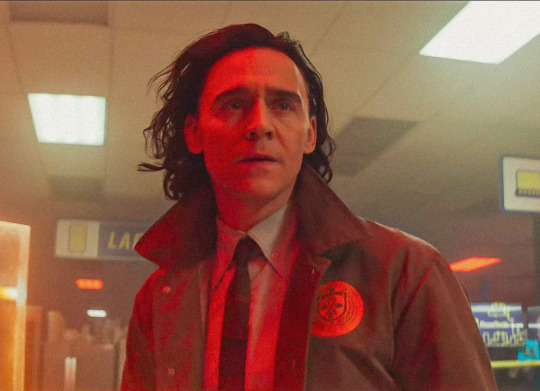

He is deeply disappointed because he was beginning to trust him... That's why he calls Loki a bad friend, and goes heavy with insults.
But during the interrogation he is just doing his job. Remember his mantra? "Work your Loki"
That interrogation is a playchess, Mobius is trying to find the real Sylvie's intentions through Loki, because Ravonna denied him to see her... The situation gets worse when they start lying to each other because they end up getting hurt.


Loki believes that Sylvie was pruned, his reaction surprises Mobius.
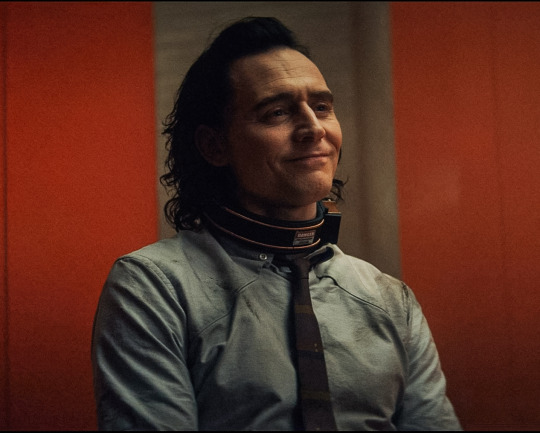

He laughs because the idea of two Lokis falling in love with each other seems pretty accurate. Starts to make fun of him. He gets serious only when Loki yells at him and asks if she’s still alive... That's when Mobius gets hurt! Why? Because he's not "jealous", he's afraid.

Mobius since episode 1 dedicates all his work to understand Loki in order to capture Sylvie and at the same time he shows great empathy towards him. Loki is a "scared little boy, shivering in the cold". Loki shows to Mobius how he can be helpful to the case. He shows Mobius the first glimmer of freedom when they go in Pompei to test Loki's theories. Mobius starts to appreciate him and not only for his intelligence.
Loki's betrayal hurt him because Mobius was starting to think that Loki could be a good person.
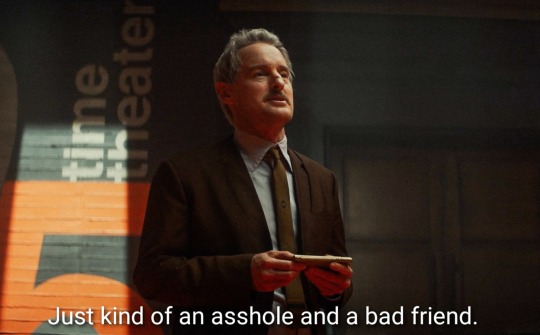
Now Sylvie, the Loki variant that has killed a lot of his colleagues, represents a big threat to the improvement of Loki. In that moment she is still a dangerous villain for Mobius and the fact that Loki is showing an affection towards her, scares him a lot.

Mobius has a soft spot for broken things, he feels the necessity to fix them. Loki in this moment represents his "mission", he wants to save him and prevent him from becoming bad again. This affection with Sylvie it's dangerous not only for it's nature, or for what it can cause to reality, but especially because it is dangerous for Loki.
For this reason Mobius doesn't believe to Loki about the TVA, because it came from Sylvie. But in any case he was cracked a little after Loki explanation, even if he didn't want to show it. Thanks to Ravonna strange behaviours, he intends to find the truth.

It's not jealousy but just fear. This is why after Mobius has found the truth he is intended to help Loki to save Sylvie, without questioning the insanity of that weird connection, actually he asks Loki if he believes to deserve to be alone. Because Mobius himself doesn't want to see Loki alone. He wants Loki to be happy.
If Mobius was really jealous I presume he wouldn't ask Loki that question and he wouldn't offer to save her first..
Bonus: I had an sudden insight. I think that Mobius' soft spot for broken things derives from his "timeline life" where something bad happened to someone important for him, a son or a daughter who he couldn't save... And now that's why he put all his effort in his work, with Loki he has found another "kid" to save, this new mission will change him and help him to find his true identity. I know that it sounds hurtful, but he's a very caring man and seems often paternal, I suppose it's a reminiscence of his "real" life before the TVA.
#Loki analysys#Mobius fears#Loki ep 4#Loki 1x04#Mobius is a complex character#Loki#Loki show#Loki meta#Mobius speculation#Sylvie#Ravonna#Tva#Mcu#Marvel#owen wilson#tom hiddleston#Loki essay
109 notes
·
View notes
Note
Someone I know is finally open to the idea that Ragnarok sucked, and asked me for posts and evidence about why. (One in particular I talked about that I can't find regarding how costume choice affected the way the characters were portrayed, especially Loki) Unfortunately, I don't really make a habit of reading through all of that, only when it shows up on my dashboard once every blue moon.
Do you know of any good metas I could share?
Here’s the outfit one I believe, plus this amazing meta on ao3 linked in that post.
The Everything Wrong With Ragnarok section of @nikkoliferous‘ In Defense of Loki masterpost is great for this and has sources provided so go wild:
Tom Hiddleston, Professional Thespian™
Chris Hemsworth, Professional Wanker™
How Taika Waititi Knowingly Sabotaged A Beloved Character
Why the “Ragnarok Shows Another Side Of Loki” Argument Is Crap
Ragnarok Is Crap, Part Deux
Also this and this post have good concise analysis too. :)
#good luck?#you have facts on your side#is luck necessary#so anyway#ragnarok has 2 redeeming quality and that's the 1. funny and 2. tesseroki#that's it i'm sorrry#no one argue for the black black suit i still think the fitting of it is off#Language!#language
94 notes
·
View notes
Text
Will the TROS nightmare never end? The movie itself was bad enough. The Rey Palpatine thing already broke the story beyond repair. Like, Star Wars has done a lot of dumb contradictory or underexplained stuff that supplementary material eventually makes work. But there’s nothing that can really salvage “they sold you for drinking money to protect you”, or Palpatine being unable to decide whether he wants Rey dead or alive or to kill him, or Rey killing Palpatine suddenly not being a problem anymore, or the Force dyad being used for evil instead of being used to defeat evil, or Ben being thrown into a pit and not actually getting to contribute to ending the war. Even a director’s cut that expands on all the rushed and underdeveloped storylines and ends the way it should’ve with Ben alive wouldn’t fix everything. Even another movie that brings Ben back to life still wouldn’t be able to go back on the Rey Palpatine stuff or Ben never getting the chance to face his abuser and avenge his family or actually contribute to the end of the war.
But on top of that, it seems like every day we’re noticing more and more flaws and layers of horror, bad messages, and character assassinations. Every time JJ and Chris open their mouths they just vomit a stream of pure nonsense that makes it even worse. And to top it off, one of the lead actors is apparently a Chris Brown supporter and openly contemptuous of the fans.
Everyone has already said the story ends here. No one wants to reprise their roles, and I’m starting to get vibes like it’s more than them just not wanting to be typecast. Like, I’m getting the impression that they did not enjoy making these movies. Not just that they were disappointed with how their characters were handled or how some of them got treated by fans but like... I kinda suspect that some of them didn’t actually get along with each other and were only pretending to be friends for the press tours, or maybe it was just that the working conditions were rough.
I keep thinking we’ve been lied to so much in the past that there’s still a chance they’ll say “PSYCHE!” there IS another movie in the works and all the actors are coming back. Like, Tom Hiddleston knew weeks before IW came out that he was getting a show, and he would’ve already filmed Endgame by then, but still had to pretend for awhile that his character was dead for good. I don’t want to give in to hopelessness but I’d also like to move on and not hold out false hope on the assumption that I can’t trust any “no” as definitive because it could be a lie.
What’s more, I know I said before that if the Mouse was feeling the heat and knew they needed to bring Ben back to salvage the franchise they wouldn’t be above straight-up blackmailing Adam Driver. But, would I want that? If Adam or Daisy or anyone else doesn’t want to do more Star Wars because the harassment or just the pressure of carrying the legacy of such a high profile franchise is bad for their mental health, or because the fitness regimens or working conditions are too grueling, or they hate the people they work with would I want them to endure that? Even if it means restoring hope to a franchise that millions of people love and ended on an incredibly bleak note, do I really want to force anybody to do something they don’t want to do? Do I ever want to see JB in another movie knowing what kind of person he is? Like, even if he apologized and it came across as sincere and not just damage control, he’s still a Chris Brown supporter.
Honestly, I wish I could just expel everything Star Wars from my mind and pretend the last four years of my life never happened, but I’d miss all the art and memes and meta analysis that taught me so much about good storytelling.
#reylo#star wars#rise of skywalker#tros#star wars tros#the rise of skywalker#star wars the rise of skywalker
39 notes
·
View notes
Note
I think its less that people don't love MCU Loki and more that they love their specific interpretation of Loki the most. People have done alot of meta and analysis on Loki and have alot of headcanons about him some based on non MCU versions of him. And a good chunk of these headcanons are things that could potentially be true since they aren't refuted in canon. They add layers to how people see him more than you would get from casually watching him. Pt 1
Now I'm not saying people don't like him as is alot of people do. Hes a entertaining sort of character and I personally love the scheming snarky bastard archetype. But Loki isnt fleshed out as well as he could be even tho I think Tom Hiddleston acting ads some more depth than the script. Even tho alot of people found him entertaining and likable alot of what fans like about him now is the depth they added from headcanons and meta. They like Loki but they like their interpatation of him more pt2
Alot of the whole woobiefying things comes more from combining versions of him outside of the MCU where he was more sympathetic as a basis for headcanons even tho it might not work Nearly as well for MCU Loki. I know it might have been worse a few years ago but my experience with that sort of thing now is more in AU fanfiction than genuine hey in canon nothing is Lokis fault. Pt.3
Fandom can always find a way to ruin a character for others, and Loki is a big one. Personally, he’s one of my faves, and he’s the most relatable for me to a certain extent. But I’ve gotten annoyed with how the fandom treats him -- my least favorite fanfiction trope I’ve seen a lot for him is people making him a victim in his own criminal activity. He doesn’t need to be a good person to be enjoyable, and I find few “poor Loki” sentiments to be realistic. Can’t wait for it to return next month. (That’s why my preferences have leaned away from MCU Loki to AoA Loki. He’s my favorite interpretation of the character so far. But the originaly mythological asshole is still a good one too.)
-Mod R
0 notes
Note
people saying, oh it wasn't intended from the beginning so it wasn't intentional thus has to stay fanfiction bug me. like, shows can develop organically based on chemistry. they can surprise you and take you in a direction that wasn't planned but now just works. like, fucking, chandler and monica wasn't planned from the beginning! but the actors had chemistry and the writers tried it out and it became iconic. you don't throw something away just because it surprised you instead of being pre-planned; you cultivate whatever gold you find!
With Hollywood entertainment in particular, I think there is a lot of ignorance regarding how the creative process, production process, post-production process, and business all work. It is readily apparent that in Hollywood, there are many hands in the kitchen when it comes to creating a movie, documentary, or show. The "Original Intent" argument is weakest when it comes to Hollywood art, and in fact fails to be a viable argument in multiple areas. I will discuss how the "Original Intent" argument fails in Hollywood in more depth under the read more, using what I know from having worked in the industry myself as a writer. And to be honest, the fact I have to pull my private professional history out online, just to prove I'm not being delulu when it comes to the importance of queer subtext in film, pisses me the fuck off.
To be clear, since this whole discourse mess on my Tumblr is likely the result of someone thinking I'm an anti-sylki: I AM NOT AN ANTI. I have an extensive analysis on Sylvie as an integral character to the Loki series, Sylki in canon, and her relationship with Mobius here.
I agree with you: a lot of amazing art deviates from the original intention, especially writing. If deviating from original intent in the writing process did not exist, we would not have DRAFT REVISIONS, we would not have IMPROV, we would not have EDITORS (whose entire job hinges on giving the writer not only grammar corrections, but feedback on how to IMPROVE character, plot, and pacing, which inherently means making changes from the original intent!). This is to say nothing of the thousands, if not tens or hundreds of thousands, of media scholars--with actual PhDs--who spend years of their lives performing meta-analysis to write academic papers on subject matters like this. Papers that become formal publications and contribute to how queer history is taught in universities! This is no different than academic scholars analyzing women and race representation and resistance in film. Why should analyzing queer representation and resistance in film be treated any less?
LET'S TALK ABOUT ORIGINAL CREATIVE INTENT VS POWER HIEARCHY & POLITICS IN HOLLYWOOD
For context with respect to this ask, a different Tumblr user critiqued against queer subtext in one of my posts using the "original intent" argument for the Loki series and Lokius specifically. By this logic, if original intent is always honored, then the original script for Loki's S2E5 (written by Eric Martin) would not have been NUKED by the executive powers that be at Marvel. [source] But no, the original intent was not honored, it was rejected. So how does one square the primacy of original intent with original intent being rejected by people who are not the artist but the people who manage Disney's finances?
In television, "Executive Producer" (i.e. Tom Hiddleston, Michael Waldron, Eric Martin, etc.) is a title that can be given to a writer or actor who has more creative say in the execution of a story than a regular staff writer or actor on crew. It also indicates that the writer or actor is in a much higher salary range compared to their professional peers. It does NOT mean the same thing as a CORPORATE "Producer" of Kevin Feige's level, who ultimately has the FINAL SAY on what does NOT end up on the cutting room floor. The corporate Producer must take into account the wishes of corporate's shareholders and board of directors, who are often multi-million if not multi-billion global investors who need the distribution of the product to succeed internationally in countries like China, which is very anti-LGBTQAI+. This is how a script like Eric Martin's S2E5 can be nuked and the writer can be contractually gagged from talking about its specific contents by Disney, lest they be SUED TO HELL for breaking their non-disclosure agreements (NDAs).
This doesn't even take into account politics.
In 2020, Ike Perlmutter, Chair of Marvel, "gave $575,000 to Trump For Victory, $35,500 to the Republican National Committee in April, $5600 for Texans For Ronny Jackson in February. 2019 saw him donate $248,000 to the Republican National Committee, $466,100 to Trump For Victory, $5,600 to Donald Trump For President." His wife, Laura, mirrored those donations. "In late 2016, he also gave $5,000,000 to the Great America PAC." [source] Ike was only recently laid off from his position in March 2023 [source]. Perlmutter was in a power-struggle at Marvel with Kevin Feige for years. Feige was promoted to Chief Creative Officer in 2019, which brought the power struggle to a head, ultimately contributing to Perlmutter's departure.
There is also Bob Iger, CEO of Disney, who was famously quoted during the Writers Guild of America strike for saying, “It’s very disturbing to me. We’ve talked about disruptive forces on this business and all the challenges we’re facing, the recovery from COVID which is ongoing, it’s not completely back. This is the worst time in the world to add to that disruption”
This is the worst time in the world to negotiate to pay your writers, YOUR CREATIVE LABOR FORCE, who entertained millions of people while they were stuck in their homes for 2 years, fairly?
And these are just two men in executive power at Marvel and Disney. We're not even talking about all the other board members and shareholders. You think Tom Hiddleston, Michael Waldron, and Eric Martin have any real power compared to these guys? They do not. They are peons by comparison. And these artists (despite their "Executive Producer" title) are always at odds with the Alliance of Motion Picture and Television Producers (AMPTP), who are ultimately not artists but FINANCIERS.
Here's another quote from a studio executive that occurred during the writer's strike:
"Receiving positive feedback from Wall Street since the WGA went on strike May 2, Warner Bros Discovery, Apple, Netflix, Amazon, Disney, Paramount and others have become determined to “break the WGA,” as one studio exec blatantly put it.
To do so, the studios and the AMPTP believe that by October most writers will be running out of money after five months on the picket lines and no work.
“The endgame is to allow things to drag on until union members start losing their apartments and losing their houses,” a studio executive told Deadline. Acknowledging the cold-as-ice approach, several other sources reiterated the statement. One insider called it “a cruel but necessary evil.”" [source 1] [source 2]
Fortunately, this negative press and the WGA members' solidarity led to the WGA getting everything they demanded. I still have friends in the industry, specifically in the WGA and MPEG. A lot of them were indeed starved out. My friend who's a film editor is still unemployed because pre-production has only recently started to ramp up again and her profession is all in post. She has to wait for production to catch-up and finish in order to get work.
If the AMPTP is willing to use clearly unethical tactics to underpay their writers and actors (don't forget the SAG-AFTRA strike that joined later), do we really think members of the AMPTP (the studio execs) are willing to honor artists' original intent if the original intent may be "offensive to some viewers" and therefore can potentially cut into their financial bottom line?
We're not naive. We know the answer to this.
OUR FLAG MEANS DEATH, KILLING EVE, AND GOOD OMENS
But what about OFMD, KE, and GO? These shows are on MAX, BBC, and Amazon Prime respectively. These corporations have a different branding image than Disney. Disney touts itself as "family friendly"; (read: on-screen LGBTQAI+ affection between two lead characters is "not family friendly"). MAX and BBC's branding type also affords them the luxury of creating content for niche audiences. Disney, on the other hand, makes additional revenue through using their plethora of licenses to make toys, additions to their theme parks, and other merch. If a parent is offended that a canonically queer character like Loki has romantic love not just for Sylvie but also for Mobius (a same-sex relationship), what are the odds of parents like them not buying Disney's merchandise? We can apply this same question to Star Wars, Pixar, and any of Disney-branded animation or live action movies. How deeply can audience offense potentially cut into Disney's bottom line? If there were no discrimination taking place, we would have LGBTQAI+ representation through a lead character in any one of their licenses already. We do not, and that is a huge red flag.
In addition, these entertainment corporations (who do not tout themselves as "family friendly") generate other sources of revenue elsewhere. Netflix generates international revenue through the production of international programming like "Squid Game" and other K-dramas such as "The Glory" or Mexican shows including, "The Surrogacy" and "Haunted: Latin America". MAX is struggling. They were bought out for that reason. With AppleTV and Hulu, their target audiences are more diverse, they offer a variety of media product, and their business strategy is ultimately different from Disney. All of this grants them more freedom in what kind of characters they choose to represent, including LGBTQAI+ characters.
Remember House and Wilson from House M.D.? That show was on FOX. We know the political alignment of FOX. Dean and Castiel from Supernatural? WB Television. Both shows came out before streaming became dominant, and thus, these shows had to cater to anyone who might happen to land on their channels. When the market demands that you cater to the widest possible audience in order to generate the largest revenue, the creatives are forced to create relatively conservative artistic product. Hence, creative censorship and our long history of queer subtext.
At Nickelodeon, the artists actually had the support of corporate to move forward with Korrasami because the final season Legend of Korra was only available online. It did not air on their channel. If that had not been the case, corporate would not have approved Korrasami. However, that approval was contingent upon the artists being subtle subtle about Korra and Asami's relationship. Even in this canon ship, the animators relied on subtext for queer romance.
Not helping Disney's case is the cancellation of "The Owl House". Why was "The Owl House" canceled? It didn't fit Disney's "brand". [source]
THE FAILURES OF THE "ORIGINAL INTENT" ARGUMENT IN HOLLYWOOD
The "Original Intent" argument fails when it comes to art in Hollywood because:
Original Intent can change, and often does change, during the creative process. This applies to all forms of art, not just Hollywood.
Multiple artists are involved in pre-production, production, and post-production. At any point in this 3-part process of filmmaking, original intent can be changed for a variety of reasons.
Studio Executives, Boards of Directors, and Corporate Shareholders have more power than the artists in Hollywood. If they think a product will not make money, they will order changes accordingly.
Disney specifically touts itself as "family friendly". Its lack of a lead character (in ANY of its live-action licenses) being in an openly queer relationship with someone who presents as the same sex, is the direct result of not wanting to lose conservative audiences.
Non-Disclosure Agreements (NDAs) are common in Hollywood and prevent artists from providing specifics regarding original intent. This is done not only to safeguard corporate's intellectual property (IP), but to also safeguard their public relations image.
THE ORIGINAL INTENT ARGUMENT WEAPONIZED
The "original intent" mindset can be either very naive or very cynical, depending on the thinker's motives for choosing this belief. Naive, in that thinking creative purity actually exists (it does not) or that oppression does not still occur in Hollywood (it does). Cynical, in that either the thinker doesn't believe in artists intentionally finding ways around mass produced arts' media censorship, which has in turn created our rich history of queer subtext in film, OR the thinker wants the "original intent" argument to invalidate a change they do not like.
The last motive is the same strategy used by fans who reject Miles Morales as being a real Spider-Man. The same strategy fans use to deny that Shuri is indeed the new Black Panther. Both are tactics used to mask racism and sexism beneath the veneer of "creative purity". Fans who have internalized racism, sexism, or queer-phobia may also use this tactic at a subconscious level to protect themselves emotionally from disappointment. Finally, there are fans who use this argument to invalidate another ship, usually a queer ship that cannot be formally canonized because of corporate studio power.
Regardless of the reasoning, using this argument is frequently insidious because it perpetuates straight white male dominance in media representation.
PERSONAL LIVED EXPERIENCE
I'm an old poc queer and have worked in Hollywood long enough to know that the writers' original vision rarely ever--IF EVER--pans out as originally intended. If you ever sit through a movie and wonder why the story feels so weird in certain parts, I can guarantee you that about 2/5ths of the time, a corporate producer stepped in and messed with the original story in post-production (usually in an poor, over-worked editor's dark editing bay) and ordered reshoots the director may not have agreed with.
I've also worked in the industry long enough to know that it is an absolutely toxic work environment in which women, people of color, and queer people still struggle to get a creative foothold anywhere. My first experience pitching a script to a prospective agent involved being asked to meet at a hotel for drinks. We didn't talk about my writing at all. What I thought would be a pitch meeting was actually the writer's version of the "Hollywood casting couch". Yes, I was propositioned. No, nothing happened to me. I walked out. This happened to me in June 2008. It was not my last experience. The "Me Too" movement that came years later in 2017 was in response to situations I have encountered like this.
Those of us who succeed are very rare, and 97% of the time, the executive staff is very, very white and male. There is absolutely oppression and exploitation of all sorts still happening in Hollywood. I fucking lived it and continue to have nightmares about it.
QUEER SUBTEXT STILL EXISTS
Thus, to deny queer subtext's validity as an art form and to only accept the words of those who are either in power or limited in what they can say because of those in power, undermines not only the artists' efforts to tell the story they want to tell but cannot tell explicitly, it also undermines queer joy and queer resistance in cinema. And yes, sometimes those artists are cis straight white male allies who want to tell these stories because they simply make sense for the characters. These people are the artists, not the financiers.
It's more mature to embrace, or at least leave alone, the loud joy others experience from shipping and performing meta-analysis instead of publicly pissing on them with the profoundly weak and ignorant argument of "original intent". Don't mess with me on this. The number of scripts I have worked on that completely warped from what I wanted, and then to have my writing credit removed or stolen, still makes me sick. Yes, I'm bitter, but I'm also glad I left.
#loki#mobius#lokius#loki season 2#writing#art#asks#queer cinema#lgbt representation#lgbtqia representation#lgbtqai#lgbtqia#hollywood#politics#entertainment industry#art vs capitalism#capitalism#personal#wga#hollywood industry
76 notes
·
View notes